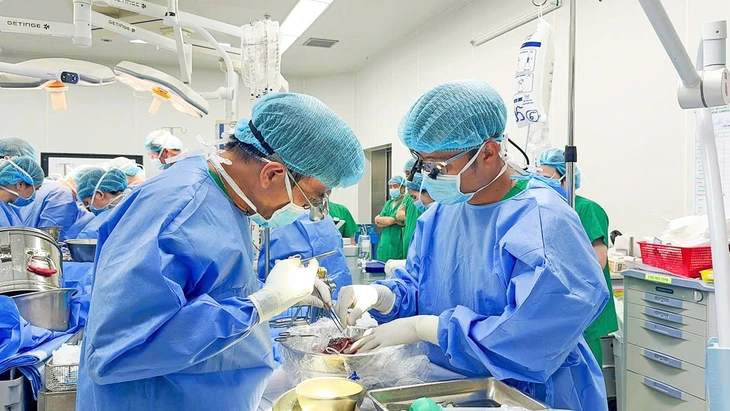Doctors at Children's Hospital 2 in Ho Chi Minh City process a piece of the left lobe of the liver after it was removed from the donor's body - Photo: Provided by the hospital.
Meanwhile, globally , 50-80% of organ transplants come from deceased donors.
Recently, many families whose loved ones have been declared brain dead have performed a noble act of organ donation to save the lives of other patients.
One death can still save many lives.
In just over a month, with two cases of brain-dead organ donation, three hospitals in Ho Chi Minh City – Gia Dinh People's Hospital, Military Hospital 175 , and Children's Hospital 2 – have for the first time performed kidney and liver transplants from brain-dead donors.
Although Military Hospital 175 had previously performed nearly 50 successful kidney transplants, it was thanks to this organ donation source that Military Hospital 175 performed its first kidney transplant from a brain-dead donor. Similarly, also from this organ donation source, it was only with its 50th liver transplant that Children's Hospital 2 performed its first liver transplant for a child patient using a brain-dead donor.
Dr. Tran Thanh Tri, head of the hepatobiliary and pancreatic transplant department at Children's Hospital 2, said that Children's Hospital 2 has been performing liver transplants on children since 2005, but only recently has the hospital performed liver transplants on pediatric patients using organs from brain-dead donors.
"The coordination of liver retrieval and transplantation is similar to that of a living donor, the only difference being the distance, which is not too far, along with the support of the organ retrieval unit and the traffic police team, so it went quite smoothly," Dr. Thanh Tri informed.
Potential organ source
Associate Professor Thai Minh Sam from Cho Ray Hospital in Ho Chi Minh City stated that Vietnam currently performs approximately 1,000 kidney transplants per year. However, the demand for kidney transplants remains very high, with around 90,000 people currently undergoing hemodialysis. The current issue is that in Vietnam, most kidney transplants come from living donors, while transplants from brain-dead or heart-dead donors account for only about 5%. Globally, 50-80% of organ transplants come from deceased donors.
Dr. Du Thi Ngoc Thu, head of the organ transplant coordination unit at Cho Ray Hospital, said that not every patient with organ failure has a family member who can donate organs for transplantation, especially organs like the heart and lungs... which can only be received from brain-dead or circulatory-dead donors.
In just over a month in Ho Chi Minh City, two brain-dead organ donors and three hospitals in the city have performed their first kidney and liver transplants from brain-dead donors, which is a positive sign. The increasing number of patients and their families who wish to donate tissues and organs after their death will give many patients a greater chance of being saved.
After organ transplantation, patients can return to normal life, improve their quality of life, work, and contribute their abilities and talents to society and their families. On the other hand, their relatives can also work, increase their income... and importantly, the cost that the government has to pay for post-transplant treatment is only 1/3 or 1/5 of the cost of treating chronic diseases that are never cured.
Currently, Ho Chi Minh City has 9 organ transplant centers, mainly specializing in kidney and liver transplants, with the majority of transplants coming from living donors.
The techniques for receiving donated organs from living donors or brain-dead donors are equally complex. However, when organs are sourced from living donors, it is crucial to ensure that the health of the recipient is not negatively affected. Nevertheless, in the long term, the possibility of kidney or liver failure due to newly developed diseases after organ donation is not ruled out. Therefore, for maximum safety, experts still recommend developing organ donation and transplantation programs from brain-dead or circulatory-dead donors.
Communication regarding organ donation programs from brain-dead or circulatory-dead donors is an integral part of a nation's transplant program development.
Organ transplants give life to many people.
According to Major General Tran Quoc Viet, director of Military Hospital 175, the current demand for organ transplants is very high, while the number of donors remains very modest. Organ transplantation is a specialized medical matter, but organ donation is a humane act, a story of society – of people willing to give a part of their body to bring life to others...
Read more Back to Homepage
THUY DUONG
Source: https://tuoitre.vn/dao-nguoc-xu-huong-ghep-tang-duoc-khong-202504220741182.htm








![[Photo] Prime Minister Pham Minh Chinh attends the Conference on the Implementation of Tasks for 2026 of the Industry and Trade Sector](/_next/image?url=https%3A%2F%2Fvphoto.vietnam.vn%2Fthumb%2F1200x675%2Fvietnam%2Fresource%2FIMAGE%2F2025%2F12%2F19%2F1766159500458_ndo_br_shared31-jpg.webp&w=3840&q=75)































































































Comment (0)